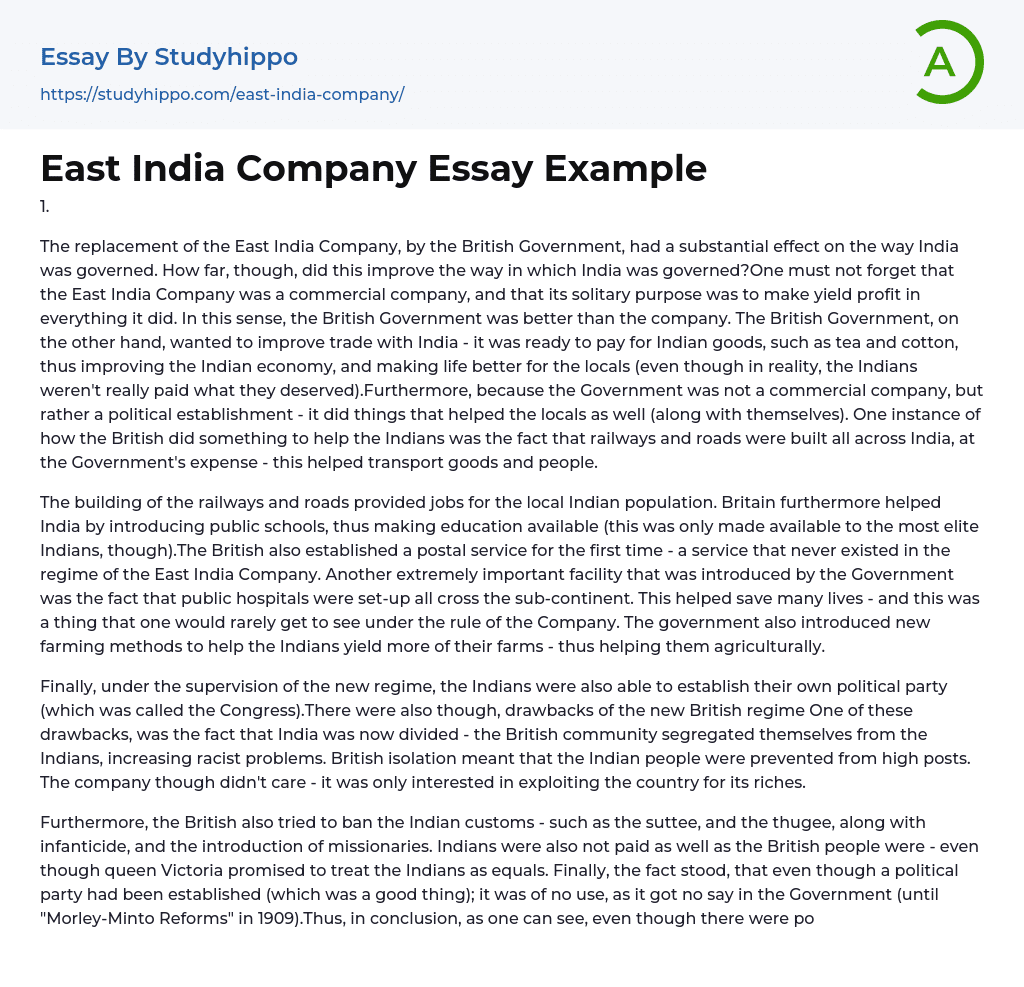1.
(There is no text toand unify.)
India's administration was significantly impacted when the British Government replaced the East India Company. The company focused on profit, whereas the government aimed to enhance trade by buying Indian goods such as tea and cotton, ultimately boosting the Indian economy despite inadequate compensation for locals. As a political establishment, the government implemented measures that benefitted themselves and locals alike, including building railways and roads across India at their own expense - facilitating easier transportation of both people and goods.
The construction of railways and roads provided employment opportunities for the local Indian population. In addition, Britain aided India by introducing public schools, although only the most elite Indians had access to education. The British also initiated a postal service, which had never existed during the rule of the East India Company. Moreover, the Govern
...ment's significant contribution was the establishment of public hospitals throughout the subcontinent, which saved numerous lives - a rare occurrence under the Company's reign. The government also implemented new farming techniques to enhance agricultural productivity for Indians.
Eventually, the Congress political party was formed by Indians under the supervision of the new British regime. However, this regime also brought some negative consequences. The British community segregated themselves from Indians, leading to an increase in racism. This isolation prevented Indian people from reaching high positions while the company only cared about exploiting the country's resources for its own profit.
In addition, the British attempted to prohibit Indian customs such as suttee, thugee, infanticide, and the spread of missionaries. Despite Queen Victoria's commitment to treating the Indians as equals, they were not paid as well as British citizens. Although
political party was established, it lacked government influence until the "Morley-Minto Reforms" in 1909. Consequently, political reforms sought to enhance governance in India but drawbacks akin to the East India Company drove a wedge between nations causing misunderstandings.
Conversely, the Chinese rejected western trade and ideas that were enforced upon them in the 19th century.
It is questioned if the statement that the Chinese were unimpressed by Western traders is accurate. Emperor Ch'ien Lung wrote to King George III after a trade delegation visited Peking in 1793, "I appreciate the clocks, guns, and telescopes you gifted me because of the effort you put in to bring them to me."
The quote reveals that many prominent individuals in China opposed foreign trade, stating, "We do not require any of your country's manufactured goods or clever novelties as we have never valued such items." It should be noted that China has never suffered from a lack of resources.
Initially, Emperor Ch'ien Lung assigned only one port (Whampoa) for foreigners to trade due to his strong dislike and distrust towards them. There were multiple reasons for his sentiments.
- Bankruptcy essays
- Earnings essays
- Tata Group essays
- S corporation essays
- Secretary essays
- Premise essays
- Adidas essays
- Amazon essays
- Apple essays
- Bmw essays
- British Airways essays
- Burger King essays
- Coca-Cola essays
- Company essays
- Costco essays
- Dell essays
- Ebay essays
- Enron essays
- Facebook essays
- Ford Motor Company essays
- Gap essays
- General Motors essays
- Google essays
- Honda essays
- Ibm essays
- Ikea essays
- Intel essays
- Iphone essays
- Johnson and Johnson essays
- Kellogg essays
- Key essays
- Kfc essays
- Mcdonald's essays
- Microsoft essays
- Myspace essays
- Nestle essays
- Netflix essays
- Nike essays
- Nokia essays
- Pepsi essays
- Pepsico essays
- Red Bull essays
- Ryanair essays
- Samsung essays
- Sony essays
- Southwest Airlines essays
- Starbucks essays
- Supermarket essays
- Tesco essays
- Toyota essays




